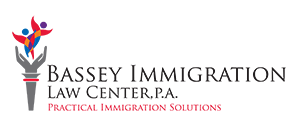The United States attracts talented and energetic immigrants who seek legal entry into the country. In some situations, however, U.S. immigration laws impose barriers to that entry, particularly if a prospective immigrant has been declared “inadmissible”.
Immigrants who are facing admissibility challenges to their entry into the U.S. can look to the Bassey Immigration Law Center for assistance from an individual and family immigration lawyer in Florida who is sympathetic to their cause. Our knowledgeable and experienced immigration attorneys have gained admission for many individuals, even where they have previously been declared inadmissible. We will devote our full time and energy toward procuring a waiver on your behalf and fighting for your right to establish safe and legal residency in the United States.
Overview of Form I-192 Waivers
Form I-192 is an application for permission to temporarily enter the United States despite grounds of inadmissibility. It is available exclusively to nonimmigrant applicants; those seeking entry for business, tourism, study, or humanitarian reasons, and is not available to individuals applying for lawful permanent residence.
Eligibibility
You may be eligible for a waiver under Form I-192 if you are inadmissible to the United States due to factors such as prior removal, criminal history, or immigration violations. To qualify, you must show that you pose no threat to U.S. national security or public safety, have a lawful purpose for temporary entry, and that your admission aligns with U.S. interests, such as humanitarian need, significant public benefit, or business or cultural exchange. Each application is reviewed individually based on the specific grounds of inadmissibility and the purpose of your visit.
This waiver is frequently used by business travelers with prior deportations or visitors with old convictions who now have strong ties or valid reasons to return.
Step-by-Step Guide: Applying for an Immigration Waiver (Form I-192)
Unlike a standard visa application, applying for a waiver of inadmissibility involves complex legal and procedural requirements. Below is a general outline of the process:
- Assess Eligibility – Carefully review the grounds on which you are deemed inadmissible and confirm whether a waiver is available under applicable immigration laws and regulations.
- Prepare Supporting Documentation – Gather relevant records, including valid identification (e.g., passport, prior visa stamps), detailed immigration and travel history, criminal or medical records if applicable, and any evidence demonstrating rehabilitation, hardship, or compelling reasons for entry.
- Complete and Submit Form I-192 – Accurately complete Form I-192, Application for Advance Permission to Enter as a Nonimmigrant, and submit it with all required supporting documents and filing fees to the appropriate U.S. Customs and Border Protection (CBP) or USCIS location, depending on your circumstances.
- Respond to Requests for Additional Evidence (RFE) – If U.S. authorities request further information or clarification, respond thoroughly and within the required timeframe to avoid delays or denial.
- Await Adjudication – Processing times can vary significantly, ranging from several months to over a year. Maintaining up-to-date contact information and tracking your case status is important during this period.
Applicants often benefit from legal representation, especially if their case involves criminal history, prior removals, or other complex inadmissibility grounds. An experienced immigration attorney can help present your case clearly and in compliance with applicable legal standards.
Common Reasons Waiver Applications Are Denied
Waiver applications may be denied even when applicants appear otherwise qualified, often due to case presentation. Common reasons for denial include submitting incomplete or inconsistent documentation, failing to provide a compelling and well-supported justification for temporary admission, misrepresentation or omission of material facts, and failing to meet the specific eligibility requirements under the applicable legal provisions.
Each application is evaluated on a discretionary basis, and failure to address all relevant factors with clarity and credible evidence can result in denial. Legal counsel can help ensure the application meets both procedural and substantive standards.
How to Strengthen Your Immigration Waiver Application
Maintaining accuracy and presenting a well-supported case are critical to improving your chances of receiving a favorable decision on a waiver of inadmissibility:
- Maintain Accurate and Organized Records: Ensure all personal, immigration, and legal documents are truthful, current, and consistently presented. Any discrepancies, omissions, or misstatements can undermine your credibility and lead to a denial.
- Clearly Articulate the Purpose of Your Visit: Provide a detailed explanation of why you are seeking temporary entry into the United States. Whether for business, medical care, or a family matter, your reasoning must align with the stated purpose of your nonimmigrant classification and be supported by objective evidence.
- Submit Substantiating Evidence: All claims made in your application should be corroborated with appropriate documentation. This includes letters of support, travel or medical records, affidavits, and other evidence that demonstrate the legitimacy of your request and any hardship or public benefit factors involved.
Impact of Criminal Convictions on Waiver Eligibility
A criminal conviction does not automatically disqualify you from obtaining a waiver of inadmissibility, but it can significantly affect your eligibility. Offenses involving moral turpitude, such as theft, fraud, or assault, and aggravated felonies are serious in the eyes of immigration authorities. Nonetheless, waivers may still be granted in certain circumstances, such as where convictions are dated and rehabilitation is well documented, where the offense is minor, or where compelling humanitarian factors or extreme hardship to qualifying individuals are present.
Health-Related Inadmissibility Waivers
Health-related grounds of inadmissibility, such as having a communicable disease of public health significance or failing to meet vaccination requirements, can bar entry to the United States. In such cases, a waiver may be available through Form I-601 rather than Form I-192. Approval generally depends on factors including whether the applicant has a credible plan for treatment or vaccination, whether denial of entry would result in extreme hardship to a qualifying U.S. citizen or lawful permanent resident relative, and whether the condition is controlled and does not pose a risk to public health or safety.
Why might an immigrant be declared “inadmissible”?
Some of the more common reasons for declaring a potential immigrant inadmissible include:
- Prior criminal convictions
- Fraud or misrepresentation (which can include matters such as stating incorrect information on an immigration form)
- Unlawful presence (such as staying in the U.S. past a visa expiration date) or improper entry into the United States
- Communicable diseases, health disorders, or failure to procure required immunizations
An immigrant can request a waiver of the grounds for inadmissibility, but the success of a waiver application will depend on selecting the correct type of waiver and completing that application with persuasive arguments and correct information.
What types of immigration waivers are available?
The type of waiver sought will depend on why the individual was declared inadmissible. The most common Florida immigration waivers include:
- I-601 “Extreme Hardship Waivers”, which are used when one or more of the immigrant’s family members are already U.S. citizens or lawful permanent residents. Though this is the most requested type of waiver requested, U.S. law does not provide a clear definition of an “extreme hardship.” Therefore, the official who reviews this type of waiver request has substantial discretion to accept or deny petition.
- I-601A Provisional Waivers, which are used when an immigrant has overstayed the 180 days provided in a temporary visa. The primary advantage of an I-601A Waiver is that the individual does not need to return to his or her home country to initiate the waiver application process. Enlisting the help of a business immigration attorney is highly recommended to help avoid having the provisional waiver fail on other grounds of inadmissibility.
- I-212 Returning After Removal. A I-212 petition is used when a previously removed individual wishes to reapply for admission to the United States. The attorney will typically also apply for an I-601 or I-601A waiver depending on the circumstances surrounding the original removal.
What if the immigration waiver is denied?
If the waiver is denied, there are two motions your attorney can file before resorting to the appeals process. These motions are:
- A Motion to Reopen the case, where the party has an opportunity present additional information in support of a request to review an adverse immigration decision
- A Motion to Reconsider, which challenges the adverse decision based on factual or legal errors that the immigration officer might have made.
Both types of motions must be filed within a very short time after an immigration waiver petition has been denied. If the motions are denied, the immigrant still has a right to appeal to the Board of Immigration Appeals.
Call Bassey Immigration Law Center today
The lawyers at Bassey Immigration Law Center provide trusted legal advice on Immigration waivers and appeals in Florida. Every member of our team has personal experience dealing with immigration, and we are all guided by a sincere passion to help as many people as we can navigate the challenges of this emotional process.
If you have been declared inadmissible and have an immediate family member living within the United States, our lawyers are ready to everything we can to help you obtain a waiver and get you back on the path to permanent resident status. We have obtained immigration approvals for hundreds of family green cards and visas, work permits, citizenships, waivers, and appeals.
For more information about how we can help you, please call our Tampa office at 813-592-4079 or our Clearwater office at 727-408-5170 to speak with an experienced Florida immigration today.

